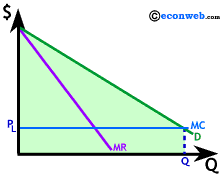

Click Here if you don't see topics listed to the left and below.

There is one case in which, theoretically, a monopolist would produce the allocative efficient level of output. If a monopolist could practice perfect price discrimination, selling each unit at a unique price equal to the social marginal willingness to pay, it would continue selling output until the price of the last unit, PL was equal to marginal cost, MC. Of course this would mean that the firm's profits are huge (the green area is total revenue) and total expenditure by consumers would be much greater, but there would be no misallocation of resources from an allocative efficiency standpoint.
Keep in mind that perfect price discrimination isn't possible so this isn't a feasible way to achieve allocative efficiency in monopoly.


Click Here if you don't see topics listed to the left and below.